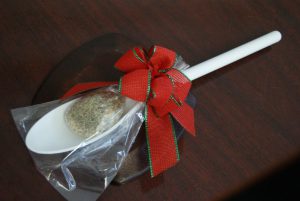by Heidi Copeland | Jan 23, 2017
 In the early 70’s Gary Iskowitz, was doing graduate work as well as teaching tax law while working for the Internal Revenue Service (IRS) agency. Mr. Iskowitz saw a growing problem with questionable tax preparers who were scamming low-income people in his area. He did not like what he saw! Consequently, he proposed that he train a minimal number (10) of likeminded student volunteers to go into the community to prepare free tax returns for underserved residents. People lined up around the block waiting for them.
In the early 70’s Gary Iskowitz, was doing graduate work as well as teaching tax law while working for the Internal Revenue Service (IRS) agency. Mr. Iskowitz saw a growing problem with questionable tax preparers who were scamming low-income people in his area. He did not like what he saw! Consequently, he proposed that he train a minimal number (10) of likeminded student volunteers to go into the community to prepare free tax returns for underserved residents. People lined up around the block waiting for them.
The following year, almost 100 students were recruited and trained to prepare free tax returns for low-income residents. The rest, they say, is history!
This college-volunteer effort significantly strengthened the Volunteer Income Tax Assistance (VITA) program. Now, more than 40 years later, VITA is still going strong.
VITA is still designed to promote and support free tax preparation service for the underserved, in both urban and non-urban locations. Service is targeted to low-to-moderate income individuals, persons with disabilities, the elderly, and limited English speaking.
Why? Just as in Gary Iskowitz’ time, this program is an effort to provide both a valuable community service and a powerful learning experience for the participants. Not only does a tax payer get their taxes done for free, the local community benefits from the monies spent by the tax payer. Plus, the IRS is pleased because citizens are in compliance with federal law.
Volunteers come from the local communities they serve.
If you plan to take advantage of any of the VITA programs this year, be sure to bring the proper documentation. A return cannot be prepared without the appropriate certification.
And know that in an effort to stop fraudulent tax return payments, beginning in 2017, if you claim the Earned Income Tax Credit (EITC) or Additional Child Tax Credit (ACTC) on your tax return, the IRS must hold your refund until at least February 15 — even the portion not associated with EITC or ACTC.
What to Bring to Your Local VITA Site:
- Proof of identification (photo ID)
- Social Security cards for you, your spouse and dependents on the tax return or a Social Security number verification letter issued by the Social Security Administration
- An Individual Taxpayer Identification Number (ITIN) assignment letter may be substituted for you, your spouse and your dependents if you do not have a Social Security number
- Proof of foreign status, if applying for an ITIN
- Birth dates for you, your spouse and dependents on the tax return
- Wage and earning statements (Form W-2, W-2G, 1099-R,1099-Misc) from all employers
- Interest and dividend statements from banks (Forms 1099)
- A copy of last year’s federal and state returns, if available
- Proof of bank account routing and account numbers for direct deposit such as a blank check
- To file taxes electronically on a married-filing-joint tax return, both spouses must be present to sign the required forms
- Total paid for daycare provider and the daycare provider’s tax identifying number such as their Social Security number or business Employer Identification Number
- Forms 1095-A, B or C, Affordable Health Care Statements
Start 2017 off right! Being well-organized and getting your information together can save you a lot of time and maybe even money!
by Melanie Taylor | Dec 5, 2016
As the holiday season quickly approaches many people become overwhelmed with all of the activities, decorating, and shopping that needs to be completed. Here are a few tips to save energy, time and your nerves.
 Let’s begin with 5 Steps to Seasonal Savings:
Let’s begin with 5 Steps to Seasonal Savings:
- Recognize Your Seasonal Stressors: Know your personal stressors—such as family, friends, work, travel, social outings and traditions (both old and new)—then you can be less stressed this holiday season. Marketing ploys sneak into every stressor, and retailers want to ensure they get their piece of the holiday pie by using marketing gimmicks to lure you into shopping with them. Do you find yourself with the overwhelming desire to get everything on your child’s list? If so, consider going without a list or setting limits, and communicate with your child. Often, parents do not involve their children in the holiday spending process. Children need help recognizing when and how they have been targeted and persuaded to want the latest and greatest item. Children also need to understand that a budget is necessary and saying “no” to an overpriced item is okay.
- Develop a Holiday Spending Plan—Make a Budget: Ask yourself: How much have I saved? How much can I save before the holidays? Am I comfortable creating debt? Am I comfortable saying “no”?Start with knowing how much you can spend and create a spending plan, which is critical for successful money management for the holidays and all year long. A few dollars from your paycheck each week adds up quickly over a year. You can also take advantage of weekly automatic transfers into your bank account, or join a holiday savings club at a local credit union. If your holiday budget shows you are spending more money than you have, then you’ll likely take on debt. If this is the case, you should also create a plan for paying off purchases made with credit. Prioritize your purchases and consider omitting purchases that require taking on debt.
- Develop a Holiday Spending Plan—Create a List and Stick to It: Make sure you have a list of everyone you plan to buy for during the holidays and of other additional expenses. Decorations, cards, postage, gift wrap, food/entertainment, and travel are additional costs that can drastically impact the holiday budget. Don’t forget to use catalogs, internet surfing for comparison shopping, and barcode scanning apps. Shopping online also limits impulse purchases, and it allows you to avoid long lines, huge crowds, and the lure to eat out while shopping. Be sure to use coupons whenever possible, and be sure to take advantage of the year-end sales. Once you’ve researched and set your budget, you’re ready to start shopping.
- Alternatives to Pricey Presents: If you have a large family, start by thinking outside the box. Consider a gift exchange by drawing names from a hat, which can allow you to put more thought than money into selecting a single gift. You can also buy a single gift for an entire family—perhaps an entertainment basket filled with DVDs and microwave popcorn. Oftentimes, thoughtful and more creative gifts can come from shopping with local businesses. Locally grown fruits and vegetables, honey, or an item from a local artist are just a few suggestions of local products. If you are feeling crafty, then you could make and give holiday arrangements such as centerpieces and decorations. Another idea for the holidays is to donate to a charity in someone’s name instead of gift giving. You can even take the idea of giving to charity to your office. Pool money you would have spent on gifts with your participating colleagues, draw a colleague’s name, and donate the money to a charity of his or her choice. Another gift idea for close friends and/or family is the “gift of time.” Create a coupon book or certificate that gives a loved one the gift of your time (a specific chore, a trip to the park, babysitting, slumber party for the kids).
- Fine-Tuning Your Financials: Use cash and/or debit cards when at all possible. Money coming directly out of your pocket will likely make you think harder about your purchase. If you are going to use a credit card, make sure you have a plan in place to pay it off when the bill is due. You also need to understand the allure of paying with credit. When you’re not paying with “real” money, your buying can easily get out of control, and the shopping process may not seem as painful in that moment. It may be appropriate to tell your older children how much they each have in the budget for holiday spending. When the family is on the same page, it can alleviate some stress. Refocus your family’s thoughts from the material goods to the real meaning of giving and receiving. Knowing your specific situation, making informed decisions, and communicating with loved ones can reduce the effects of holiday stressors.
Let’s take a look at some affordable and DIY Christmas gifts that will be truly appreciated by the recipient.
For the gardener in your life:
Terrarium Kit
Materials:
- One – 3 1/2″ x 7″ canning jar with top
- Small stones (enough to fill 1 inch in jar) You can buy pretty river rocks at your local garden shop or just collect some stones outside.
- A few tablespoons of activated charcoal (found at any pet store’s aquarium section)
- 1 small Ziploc bag
- 3 1/2″ x 5 1/4″ printed terrarium instructions card on card stock (download from witandwhistle.com or create your own)Step 2: Slide an instruction card into the front of the jar. Secure the card amongst the rocks. Step 4: If you’re feeling crafty you could add a decoration or two (plastic or clay mini mushrooms, insects, gnomes, fairies, etc.) in your terrarium kit.
- Step 5: Tie some twine or ribbon around the jar, and you’re done. You don’t even need to wrap it!
- Step 3: Pour a few tablespoons of activated charcoal into a small Ziploc bag and add it to the jar.
- Step 1: Put about an inch of small stones in the bottom of a jar.
For the spa lover in your life:
Basic Silk Bath Bomb
Materials:
- 1 cup Citric Acid (found in canning section of grocery store)
- 3 cups Baking Soda
- 1 teaspoon Essential Oil (purchase at local health food store)
- Witch Hazel Spritz (purchase in pharmacy section)
- Dry Pigment Colorant – if using
- Round mold to shape the bath bomb (Molds are round plastic ornaments found at your local craft store.)
- Directions:
- Blend the citric acid and baking soda—add colorant and fragrance oil.
- Spritz, Witch Hazel onto your batch using a squirt bottle with one hand while stirring with the other until the bomb sticks together when squished. (it will have the consistency of wet sand)
- Form the bomb in the molds.
- Air-dry for 3 or 4 hours spritzing a few times – allow to set overnight (The Witch Hazel forms a crust on the outside that prevents them from cracking and falling apart; however, they’re still fragile)
- Wrap in tissue paper or cellophane. Tie a bow and you’re done.
Other DIY ideas…homemade soaps, herb infused oils, jams and jellies, baked goods, hot cocoa mix, etc.
When we think of the holidays, we often think about family, togetherness, giving, and celebrating. While the holiday season should be a time of enjoyment, there are many events associated with the season that can cause stress. Remember, in the long run the memories will be of time spent together, not the gifts they received. So, be sure to plan ahead, take a deep breath, and enjoy the special holiday moments.
If you have further questions, please contact your local UF/IFAS Extension Office.
Resources:
“Five Steps to Seasonal Savings” – UF/IFAS EDIS Publication #FCS5267
“Managing Stress During the Holidays” – UF/IFAS EDIS Publication #FCS5266
witandwhistle.com
by Marjorie Moore | Nov 25, 2016
I don’t know about you but to me it seems we just finished shopping for the holidays and they are here once again. Holiday shopping can be a whirlwind and we forget to take time to stop and think about how much we have spent until the bills arrive. Having a budget for the holidays can be your best defense to not overdoing it this holiday season.
If you plan for the holidays, it can save lots of time, energy, and of course, money. It is important to prepare a budget, make the budget realistic and base it on your cash flow and financial obligations. Once your budget has been created, stick to it!
The next step – make a list of gifts you want to give. When shopping, use cash whenever you can as this helps you watch how much you are spending. When you have reached your budget limit, your shopping should be done! If possible, do not use credit cards to buy gifts. If you use credit cards, keep track of the amounts and stop when you have reached your budget limit.
Gift cards appear to be great but be aware of fees or usage terms that can reduce the value of the gift. Before buying gift cards, ask if the card can be used for online purchases. This may not affect most retailers but some online retailers do not allow using gift cards.
If you want to stretch your budget, you don’t have to purchase all of your gifts. Try making gifts such as food or give a coupon book volunteering your services (i.e. babysitting or yard work). Below is a mix ranch dressing recipe you can give to family and friends this holiday season.
To help with your shopping next year make your list early, then spread your shopping throughout the year.
Use these tips to help you enjoy your holiday.
Spoonful Mix for Ranch Dressing
2 tsp. dried parsley flakes
1 tsp. salt free herb seasoning blend
½ tsp. garlic powder
¼ tsp. dried basil leaves
- Mix all ingredients in small bowl.
- Place mix in to plastic wrap and attach to spoon.
- Decorate spoon with a pretty bow.
Ranch Dressing
Remove decorative wrappings from spoon, leaving the mix inside the plastic wrap and still attached to spoon.
- Empty ½ cup low-fat mayonnaise and ½ cup low-fat buttermilk into a medium bowl.
- Hold spoon over bowl and cut open bag of mix, allowing mix to fall into bowl onto mayo and buttermilk.
- Mix until very well blended (use gift spoon to mix). Refrigerate 30 minutes up to 8 hours to blend flavors.
For more information on holiday shopping, contact your local Extension office.

by Marie Arick | Nov 17, 2016

The holidays are fast approaching! Pause long enough to avoid the pitfalls of overspending. Budgets are always tight during holidays. Gifts are not about the cost, rather they are a display of the true relationship of the people involved.
Gift giving at its finest is a true art form. I have a dear friend who really captures the essence of each person with each gift she gives. Gifting is a statement that demonstrates how important the receiver is and how they are perceived in the giver’s eyes.
Always consider the occasion and the relationship with the receiver. It is also important to know the receiver’s culture as to be certain not to offend. A gift given as an afterthought usually displays just that – it was not originally intended to be given. This is not generally the intention of the giver but can give this impression. Additionally, if you intend to re-gift an item, be certain the item meets the personality of the receiver. Re-gifted items tend to be unusual or offbeat, so think hard before taking this path.
Consider practical, useful gifts that match the person you are shopping for. The idea of gifting a need, a want, a clothing item, and a literature item to a person has been one of the most recent trends. Very few people buy that many gifts for those outside of their immediate family. But, this could be applied to others by just taking one of the options. If they are a reader, consider a gift card to a local bookstore instead of a specific title. This provides the option of an e-book or print version. Or, clothing could come in the form of a nice scarf or other accessory that is a part of their usual style.
A gift is a statement of caring. For each person, this is different. Take the time to consider personality, hobbies, interests, and activities. Choose a gift that matches one or more of these considerations. This lends to the true purpose of gifting – to show the receiver how much they mean to you.

by Angela Hinkle | Sep 28, 2016
 I did it! Or should I say, I didn’t do it! Or more realistically, I almost didn’t do it! What? Spend money in the month of September. Some of you may remember my wallet really needed a break, so I set a goal to spend no money in the month of September unless absolutely necessary.
I did it! Or should I say, I didn’t do it! Or more realistically, I almost didn’t do it! What? Spend money in the month of September. Some of you may remember my wallet really needed a break, so I set a goal to spend no money in the month of September unless absolutely necessary.
Did this help? Yes, my wallet, checking account, and credit cards seem much more at peace. Was it easy? Except for a few bumps and hiccups, it wasn’t too bad. Like a good financial citizen, I paid all by bills and gave at church, I kept gas in my car, and had plenty of food (in my house).
However…
Snafu #1: The food thing was a little trickier when it came to work. I went to a conference and for five days, we only received one dinner, one lunch, and two breakfasts. The people from Idaho brought and gave out great potato chips (but I could not and should not try to live off of those). I brought lots of nuts, granola bars, and small containers of fruit in my suitcase but still had to fork out money for three dinners and one lunch with a little more substance. My traveling companion knew of the goal I had set and was nice enough to buy me dinner one night. (I think I must have looked really sad and hungry.)
Snafu #2: When did September become the season of giving? A wedding and a baby shower brought out the checkbook. Oh well, there are a new bride and mom-to-be who are happy.
At home, the only food I had to buy was bread (yes, I could have frozen some – yuck, or made some – no time) and milk (yes, I could have used the dry milk – yuck to drink) and since I miscalculated the amount of dog food in the house, I had to buy some of that, too. I will give a big shout out for canned and frozen foods. It was no big deal to not go out to eat nor go to the movies or to other forms of entertainment. (The good stuff doesn’t usually come out until October anyway.)
What about my all-important trips to the nail salon? Ha! I found a gift certificate (I love those things) that took care of both trips to the salon.
Though I didn’t go hard-core all the way, I did really well. I feel so much better and I’ve veered off my path toward debtor’s prison (yes, exaggeration).
I am blessed to have a comfortable life so this was not that difficult. One month without extra spending was a free gift I gave myself. See if giving yourself the gift of a no-spend month makes your life better. Then be sure to share your success stories.

by Angela Hinkle | Sep 7, 2016
The month of August has been a financially painful time for me. I blame this on the fact that my only child has just begun her first year at college. Lots (and I mean a whole lot) of spending happened in preparation for this auspicious endeavor.
- Ouch – I began to question if I was spending more than I was making. (This was brought on by reading Building a Spending Plan: All Six Steps, a UF/IFAS EDIS publication.) Actually a very helpful financial read. Check it out: http://edis.ifas.ufl.edu/pdffiles/HE/HE82700.pdf
- Ouch – My credit card bills in the last few months have been quite hefty.
- OUCH – The college bills for housing and tuition came due.
What to do to help alleviate some of the pain caused by this financial stress? I remember reading about “no-spend” months. People often pick February because it has the fewest number of days. But I feel the need for immediate action – and so September it is.
A no-spend month means you don’t spend money on anything except the absolute necessities. I have to pay the mortgage, the car payment, utilities, and I have to get may nails done (yes, that is, in fact, a necessity for me). But no buying clothes or shoes, going out to eat, going to the movies, buying gum or an emergency caffeinated drink. Since there is no child in my house now, I think I may actually be able to do this.
Researchers say if we tell others about our goal, we are more likely to work hard to achieve it. So I told the participants in a health class I was teaching about this goal of mine. One very sweet, gentle, older woman said, “Honey, you know you can’t do that.” My somewhat deflated response was, “Why?” Her kind answer – “You know you’re going to send that child care packages.” Right she was.
However, undeterred, quite determined actually, I have found ways to plan around such obstacles. I sent a care package to the child at the end of August and will send the next one at the beginning of October. I will eat out of the fully stocked freezer and pantry to avoid trips to the store. I will start September with an already full tank of gas. I will watch TV at home. I will do this!
Once October rolls around, check back in and I’ll let you know how I did. Wish me luck!
 In the early 70’s Gary Iskowitz, was doing graduate work as well as teaching tax law while working for the Internal Revenue Service (IRS) agency. Mr. Iskowitz saw a growing problem with questionable tax preparers who were scamming low-income people in his area. He did not like what he saw! Consequently, he proposed that he train a minimal number (10) of likeminded student volunteers to go into the community to prepare free tax returns for underserved residents. People lined up around the block waiting for them.
In the early 70’s Gary Iskowitz, was doing graduate work as well as teaching tax law while working for the Internal Revenue Service (IRS) agency. Mr. Iskowitz saw a growing problem with questionable tax preparers who were scamming low-income people in his area. He did not like what he saw! Consequently, he proposed that he train a minimal number (10) of likeminded student volunteers to go into the community to prepare free tax returns for underserved residents. People lined up around the block waiting for them.








